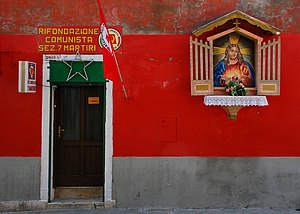Portal:Communism
IntroductionCommunism (from Latin communis, 'common, universal') is a left-wing to far-left sociopolitical, philosophical, and economic ideology within the socialist movement, whose goal is the creation of a communist society, a socioeconomic order centered around common ownership of the means of production, distribution, and exchange that allocates products to everyone in the society based on need. A communist society would entail the absence of private property and social classes, and ultimately money and the state (or nation state). Communists often seek a voluntary state of self-governance but disagree on the means to this end. This reflects a distinction between a more libertarian socialist approach of communization, revolutionary spontaneity, and workers' self-management, and a more authoritarian vanguardist or communist party-driven approach through the development of a socialist state, followed by the withering away of the state. As one of the main ideologies on the political spectrum, communism is placed on the left-wing alongside socialism, and communist parties and movements have been described as radical left or far-left. Variants of communism have been developed throughout history, including anarchist communism, Marxist schools of thought, and religious communism, among others. Communism encompasses a variety of schools of thought, which broadly include Marxism, Leninism, and libertarian communism, as well as the political ideologies grouped around those. All of these different ideologies generally share the analysis that the current order of society stems from capitalism, its economic system, and mode of production, that in this system there are two major social classes, that the relationship between these two classes is exploitative, and that this situation can only ultimately be resolved through a social revolution. The two classes are the proletariat, who make up the majority of the population within society and must sell their labor power to survive, and the bourgeoisie, a small minority that derives profit from employing the working class through private ownership of the means of production. According to this analysis, a communist revolution would put the working class in power, and in turn establish common ownership of property, the primary element in the transformation of society towards a communist mode of production. Communism in its modern form grew out of the socialist movement in 19th-century Europe that argued capitalism caused the misery of urban factory workers. In the 20th century, several ostensibly Communist governments espousing Marxism–Leninism and its variants came into power, first in the Soviet Union with the Russian Revolution of 1917, and then in portions of Eastern Europe, Asia, and a few other regions after World War II. As one of the many types of socialism, communism became the dominant political tendency, along with social democracy, within the international socialist movement by the early 1920s. (Full article...) Selected article
Al-Ansar (Arabic: الأنصار, 'the Partisans') was a guerrilla force attached to the Iraqi Communist Party, active between 1979 and 1988. When the alliance between the Communist Party and the Baath Party ended, a wave of harsh repression against the Communist Party followed. In 1977 the regime launched a crackdown against the communists. A number of communist cadres fled to the Kurdish areas in northern Iraq to escape arrest. By January 1979, the exiled communists had established ansar (partisan) fighting units. By April 1979 the ansar movement was operational. Headquarters of the partisan units were established in Kirkuk and as-Sulemaniyah, and bases were established in Irbil. Later, bases were also set up in Dohuk and Nineveh. The build-up of the ansar movement did however occur without the full consent of the politburo of the party.
In South Yemen, a number of Iraqi Communist Party cadres began military training before joining the guerrillas in northern Iraq. The training was administered by the South Yemeni government. Selected biographyBlas Roca Calderio (24 July 1908 – 25 April 1987) was the First President of the National Assembly of People's Power in Cuba, leader of the Communist Party of Cuba, editor of the communist newspaper 'Hoy', and influential member of Castro's government. Blas Roca, a leading theoretician of the Cuban Revolution who led Cuba's prerevolutionary Communist Party, left school at the age of 11 and began shining shoes to help support his poor family. He changed his name to Roca, meaning 'rock', after he joined the Communist Party in 1929. 1929, was elected Secretary General of the Union of Shoemakers of Manzanillo. In August 1931 he was co-opted to the Central Committee of the Communist Party and head of his organization in Oriente Province. During this stage displayed a wide journalistic activity in the labour press and led the popular protests that culminated in the historic general strike of August 1933, which overthrew the Machado dictatorship. Did you know...
Selected image
Related portalsRelated WikiprojectsRelated featured content Participate!Everyone is welcome to participate in WikiProject Socialism, where editors collaborate to improve all aspects related to socialism on Wikipedia. Selected quote
SubcategoriesWant to find an article related to communism? Try browsing through any of the main categories below:
Select [►] to view subcategories
GeneralVariations of CommunismOrganizations and ruling parties, past and present
Personalities
Present and former Socialist states (under the direction of Communist parties)
Ideology and tactics
StructureMarxian economics topicsHistorical events
Military topics
Artists and writers
Influential works
Anti-communism
Things you can do
Communism in non-English WikipediasArticles:
Associated WikimediaThe following Wikimedia Foundation sister projects provide more on this subject:
Discover Wikipedia using portals |

























